
BULLETIN OF ENVIRONMENTAL CONTAMINATION AND TOXICOLOGY
Scope & Guideline
Championing the fight against environmental contamination.
Introduction
Aims and Scopes
- Environmental Toxicology:
Research addressing the toxic effects of pollutants, including heavy metals, pesticides, and microplastics, on various biological systems, including aquatic and terrestrial organisms. - Ecological Risk Assessment:
Studies aimed at evaluating the ecological risks posed by contaminants in different environments, focusing on bioaccumulation, biomagnification, and overall environmental health. - Bioremediation and Phytoremediation:
Investigation of biological methods for the remediation of contaminated environments using plants and microorganisms to detoxify polluted soils and waters. - Microplastics Research:
Exploration of the sources, distribution, and ecological effects of microplastics in various ecosystems, particularly their impact on aquatic organisms and food webs. - Chemical Contaminants Analysis:
Methodological advancements in the detection and quantification of environmental pollutants, including the development of novel analytical techniques for assessing contamination levels. - Human Health Risk Assessment:
Research linking environmental contaminants to potential health risks in human populations, focusing on exposure pathways and toxicological impacts.
Trending and Emerging
- Microplastic Pollution:
Increasing focus on the sources, impacts, and remediation strategies for microplastics in various ecosystems, reflecting growing public and scientific concern over plastic pollution. - Nanotechnology in Environmental Science:
Emerging research on the use of nanomaterials for environmental remediation, including their potential benefits and risks in contaminant removal and toxicity. - Interactive Effects of Pollutants:
A shift towards understanding the combined effects of multiple pollutants, including chemical interactions and their cumulative impact on ecosystems. - Emerging Contaminants:
Growing emphasis on the study of emerging contaminants such as pharmaceuticals and personal care products, particularly their environmental fate and biological effects. - Ecological Restoration and Resilience:
Research focusing on ecological restoration practices in contaminated sites, emphasizing resilience and recovery of ecosystems affected by pollution. - Human Health and Environmental Linkages:
An increasing trend towards studies that connect environmental contamination with human health outcomes, highlighting the importance of understanding exposure pathways.
Declining or Waning
- Historical Contaminant Studies:
Research focusing on historical contaminants and their long-term effects appears to have decreased, possibly overshadowed by emerging contaminants and immediate environmental issues. - Conventional Pollutant Effects:
Studies addressing conventional pollutants like nitrates and phosphates have become less frequent as attention shifts toward more complex and novel contaminants such as microplastics and pharmaceutical residues. - Single Contaminant Studies:
There is a noticeable reduction in studies that focus solely on the effects of individual contaminants, with a trend toward investigating the combined effects of multiple pollutants.
Similar Journals
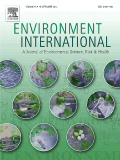
ENVIRONMENT INTERNATIONAL
Advancing Environmental Knowledge for a Sustainable FutureENVIRONMENT INTERNATIONAL is a premier journal dedicated to advancing the field of environmental science. Published by PERGAMON-ELSEVIER SCIENCE LTD, it boasts an impressive impact factor and holds a prestigious Q1 classification in the Environmental Science category, reflecting its influence and reputation within academia. Since transitioning to Open Access in 2019, the journal has increased its accessibility, allowing a wider audience—from researchers to industry professionals—to engage with cutting-edge studies that address crucial environmental challenges. With a Scopus rank of #3 out of 233 in General Environmental Science and a commendable 98th percentile, ENVIRONMENT INTERNATIONAL is committed to publishing high-quality research that informs policy and practice. Covering a broad spectrum of topics from pollution and climate change to sustainable development, this journal serves as a vital resource for those dedicated to making a positive impact on our planet. For submissions, inquiries, or to explore its extensive archives dating from 1976 to 2024, please visit their site at the Kidlington, Oxford headquarters.
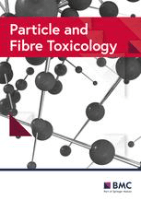
Particle and Fibre Toxicology
Advancing knowledge on particulate health impacts.Particle and Fibre Toxicology is a leading open-access journal dedicated to advancing the field of toxicology, specifically focusing on the health impacts of particulate matter and fibers. Published by BMC since 2004, this journal operates from its offices in the United Kingdom and has gained significant recognition in the scientific community, achieving an impressive impact factor that highlights its relevance and influence. As indicated by its Q1 ranking in various categories including Health, Toxicology and Mutagenesis and Medicine (miscellaneous), it occupies a prestigious position in the academic landscape, appealing to researchers, professionals, and students alike. With a Scopus ranking of #4 in Toxicology and #7 in Environmental Science, the journal ensures high visibility and accessibility, providing a platform for the dissemination of key research findings and innovative methodologies in the interdisciplinary domains of toxicology. Through its commitment to open access, Particle and Fibre Toxicology fosters knowledge-sharing and collaboration, facilitating significant advancements in our understanding of the toxicological effects of environmental agents.

Frontiers in Toxicology
Shaping the Future of Toxicological UnderstandingFrontiers in Toxicology, published by Frontiers Media SA, is a prominent open-access journal dedicated to advancing the understanding of toxicological science. Established in 2019, it serves as a vital forum for innovative research, offering insights into the pharmacological impacts and toxicological profiles of various substances. With its international reach based in Switzerland, this journal has quickly ascended in the academic community, achieving a notable Q1 ranking in Pharmacology, Toxicology and Pharmaceutics (Miscellaneous) and a Q2 ranking in Toxicology as of 2023. The journal is indexed in Scopus, where it ranks #8 out of 43 in its primary category, underscoring its influence and relevance in the field. The scope encompasses cutting-edge studies on the mechanisms of toxicity, including both human and environmental impacts, making it an essential resource for researchers, professionals, and students alike. By promoting open access to high-quality research, Frontiers in Toxicology plays a crucial role in enhancing knowledge sharing and fostering collaboration across disciplines.
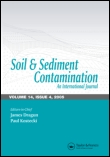
SOIL & SEDIMENT CONTAMINATION
Connecting academia and practice in soil and sediment remediation.SOIL & SEDIMENT CONTAMINATION is an esteemed journal published by Taylor & Francis Inc, focusing on critical research in the realms of environmental chemistry, soil science, and pollution. With an ISSN of 1532-0383 and an E-ISSN of 1549-7887, the journal serves as a vital platform for disseminating innovative studies from 1996 to 2024, offering insights that are pivotal to both academic and professional communities. Operating from the United Kingdom, this journal holds a respectable ranking within Q3 in Environmental Chemistry and Health, Toxicology and Mutagenesis, and Q2 in Soil Science as of 2023, indicating its significance in the respective fields. Researchers and professionals are encouraged to explore the journal's open access options, enhancing visibility and access to groundbreaking studies on soil and sediment contamination. With a Scopus ranking placing it in the 66th percentile for Soil Science and substantial contributions to understanding environmental pollutants, SOIL & SEDIMENT CONTAMINATION is essential for those dedicated to advancing the science and remediation of contaminated environments.
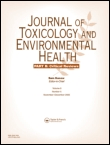
JOURNAL OF TOXICOLOGY AND ENVIRONMENTAL HEALTH-PART B-CRITICAL REVIEWS
Innovative reviews shaping the future of toxicology.Welcome to the JOURNAL OF TOXICOLOGY AND ENVIRONMENTAL HEALTH-PART B-CRITICAL REVIEWS, a prestigious publication under TAYLOR & FRANCIS INC based in the United Kingdom. With an impressive impact factor and ranked in the Q1 category for both Health, Toxicology and Mutagenesis, and Toxicology, this journal provides critical insights into the fields of toxicology and environmental health. Since its inception in 1998, it has become a key resource for researchers, professionals, and students, offering rigorous peer-reviewed articles that synthesize and critically appraise current knowledge in the discipline. The journal is recognized globally, ranking #5 in Toxicology and #12 in Environmental Science according to Scopus, highlighting its crucial role in advancing research and understanding in these essential areas. The journal also embraces open access options, making it easier for a broader audience to access vital research findings. Engage with the latest developments and critical analyses that are shaping the future of environmental health and toxicology by exploring our comprehensive collection of reviews and articles.
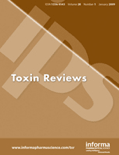
Toxin Reviews
Connecting Researchers to Practical ApplicationsToxin Reviews is a premier academic journal focused on the critical field of Toxicology, published by Taylor & Francis Inc. Established with an aim to foster research and disseminate knowledge, this journal has been pivotal since its inception in 1982 and continues to be a leading platform for both emerging and established researchers. With an impressive impact factor and ranked in the 75th percentile among its peers in the Scopus categories, it serves as an essential resource for scientists, practitioners, and students interested in understanding the complexities of toxins and their effects on health. The journal provides an Open Access platform, enhancing visibility and accessibility of research findings to a broader audience. Covering a wide scope, Toxin Reviews plays a vital role in bridging gaps between toxicological research and practical applications, ensuring that rigorous scientific inquiry translates into real-world solutions.
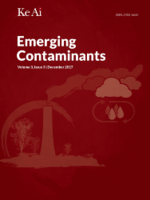
Emerging Contaminants
Advancing knowledge on novel pollutants.Emerging Contaminants is a leading international journal dedicated to the exploration and analysis of novel pollutants, their effects, and the methodologies for their detection and remediation. Published by KEAI PUBLISHING LTD in China, this Open Access journal has been at the forefront of scientific discourse since its inception in 2015, allowing unrestricted access to cutting-edge research. With an impressive categorization in the top Q1 quartile across diverse fields, including Health, Toxicology and Mutagenesis, and Public Health, it ranks remarkably high—41st out of 665 in Public Health and 10th out of 133 in Toxicology according to Scopus metrics, demonstrating its vital role in advancing our understanding of environmental health risks. By bridging the gap between academia and practical applications, Emerging Contaminants not only enriches the scientific community but also serves as an essential resource for policymakers and industry leaders seeking effective solutions to environmental challenges. Researchers, professionals, and students alike are encouraged to engage with the journal’s comprehensive studies and findings, contributing to a sustainable future.

Environmental Chemistry and Ecotoxicology
Unveiling insights for a healthier planet.Environmental Chemistry and Ecotoxicology, published by KEAI PUBLISHING LTD, is a pioneering Open Access journal that has been at the forefront of research since its establishment in 2019. With an impressive trajectory that converges research excellence until 2024, the journal focuses on critical developments in the fields of environmental chemistry and ecotoxicology. It boasts a commendable market position, ranking in the top 3% among leading journals in Agricultural and Biological Sciences, Environmental Science, and related disciplines, as demonstrated by its high Scopus ranks. The journal is committed to disseminating groundbreaking research that addresses the pressing challenges of environmental sustainability and chemical safety, making it an essential resource for researchers, professionals, and students aiming to navigate the complexities of our ecological landscapes. By embracing an Open Access model, the journal ensures that valuable insights are accessible to a global audience, fostering collaboration and innovation in the field.
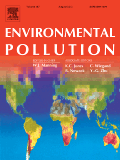
ENVIRONMENTAL POLLUTION
Pioneering research in toxicology and public health.Environmental Pollution, published by Elsevier Science Ltd, stands at the forefront of research related to environmental contaminants and their effects on health and ecosystems. With an impressive impact factor reflected in its Q1 rankings across various categories including Health, Toxicology, and Pollution, this journal is a pivotal resource for academics and professionals in the fields of environmental science and toxicology. The journal, established in 1973, continues to disseminate high-quality articles that explore the implications of pollution and advance knowledge on toxicological impacts and mitigation strategies. Although it is not an open-access journal, it offers robust visibility within the scientific community, ensuring vital research reaches those who need it most. Researchers, students, and professionals dedicated to understanding and addressing the challenges of environmental pollution will find Environmental Pollution to be an indispensable platform for their work, guiding the ongoing dialogue on sustainable practices and public health protection.

Food Additives and Contaminants Part A-Chemistry Analysis Control Exposure & Risk Assessment
Empowering researchers to mitigate risks in food safety.Food Additives and Contaminants Part A-Chemistry Analysis Control Exposure & Risk Assessment, published by Taylor & Francis Ltd, is a leading journal in the field of food science, toxicology, and public health. With an ISSN of 1944-0049 and an E-ISSN of 1944-0057, this esteemed publication has established itself as a vital resource for researchers and professionals involved in the analysis and regulation of food additives and contaminants. Since its inception and through its converged years from 2008 to 2012 and again from 2014 to 2023, the journal has maintained an impactful presence, notably achieving a Q2 ranking in diverse categories including Chemistry (miscellaneous) and Food Science, alongside commendable standings in Health and Environmental Health. The journal’s mission is to foster high-quality research by providing a platform for critical studies related to chemical analysis, exposure assessments, and risk management in food safety. By prioritizing engaging, peer-reviewed content, it aims to enhance understanding and mitigate risks associated with food additives, making it an indispensable tool for academics, practitioners, and policymakers alike.